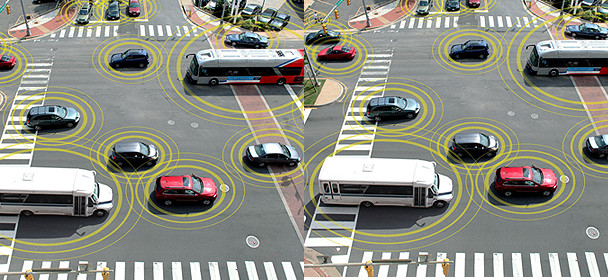Research shows drivers support connected vehicle technology, potential safety benefits

A
recent study revealed that the overwhelming majority of drivers who have
experienced technology allowing vehicles to communicate with each other have a
highly favorable opinion of its safety benefits.
The
data was released in late May by the U.S. Department of Transportation and
featured a partnership between the National Highway Traffic Safety
Administration (NHTSA) and the Research Innovation Technology Administration
(RITA). The organizations have been working with the auto industry, state and
federal partners to research the effectiveness and feasibility of vehicle
connected technology that enables cars to talk to one another with Wi-Fi-like
technology that could help prevent crashes altogether.
“Safety
is our top priority, and we are always looking for ways that innovative
technology can be harnessed to improve driver safety,” said Transportation
Secretary Ray LaHood, in
a press release. “Connected vehicle technology offers tremendous
promise for improving safety, reducing traffic jams and increasing fuel
efficiency. It’s encouraging to see that most drivers agree and want this
technology in their cars.”
Pilot
programs driver acceptance clinics were held across the country at the
Intelligent Transportation Society of Americas 2012 Annual Meeting held at the
National Harbor today. The programs, held between August 2011 and January 2012,
gathered feedback from 688 drivers who used the vehicle-to-vehicle
communication technology. An overwhelming majority agreed theyd like features
in their own vehicles, and most believed the technology would be useful in
improving overall driver safety. Some features include alerting drivers about
cars approaching an intersection, warning of possible forward collisions and
notifying drivers of cars changing lanes or moving into the drivers blind
spot.
“Vehicle-to-vehicle
technologies have the potential to significantly reduce fatalities and injuries
in crashes and could one day help motorists avoid crashes altogether,”
said David Strickland, NHTSA Administrator. “These technologies may prove
to be the next game-changer as we look at the future of auto safety.”
A
second phase of the program will be launched this summer, where about 3,000
vehicles will do crash-avoidance technologies that include do not pass alerts
and warnings of a vehicles stopping suddenly.
“Intelligent
Transportation Systems are the future of driver, roadway and vehicle safety,
said RITA acting administrator Gregory D. Winfree. “We want to build a
solid foundation for the next generation of transportation through consistent
standards, reliable technology, and policy work that ensures when the technology
is ready, the general public will be ready as well.”
Eight
major automotive manufacturers are working closely with the Department on this
research through partnering agreements: Ford Motor Company, General Motors
LLC., Honda R&D Americas, Inc., Hyundai-Kia America Technical Center, Inc.,
Mercedes-Benz Research and Development North America, Inc., Nissan Technical
Center North America, Toyota Motor Engineering & Manufacturing North
America, Inc. and Volkswagen Group of America, Inc.





